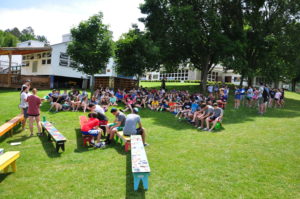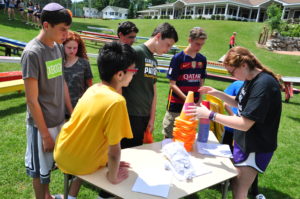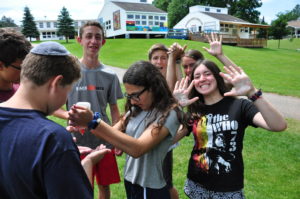by Carl Schrag, Visiting EducatorImagine more than 100 teenagers grappling with how to set priorities as they build new communities. That’s how campers from Machon, Bogrim, and Tikvah spent a day last week: They worked in family groups to establish the “new” city of Tel Aviv, the first kibbutz of Degania, and the first Jewish community to live outside the walls of Jerusalem’s Old City in the Mishkenot She’ananim neighborhood.
It was all part of a 24-hour immersive experience created for campers by a committee of five staff members from the three aidot. They set out to fashion an experience that would prompt campers to work collaboratively to set communal priorities and to work to build a new society. Using a complex system of resources that was modeled roughly on the popular board game Settlers of Catan, the campers strategized, traded with their neighbors, and accumulated points as they built three remarkable communities on the slopes of the Kikar.
This simulation of chalutzim building pre-State Israel taught campers a lot about the origins of the Jewish state. At the same time, they had ample opportunity to reflect on the values that have been central to the 70-year evolution of Camp Ramah in Wisconsin, and to embrace the process of creating intentional communities.
If this simulation program was the focus of my time at camp this summer, dayenu. But it was only one of many projects that kept me busy. In the course of a weekend, more than 20 American and Israeli staff members joined an intensive seminar that explored the Israeli government’s recent decision to suspend the Western Wall compromise. While everyone came in with an opinion, they left with nuanced understanding of many notions of the complex issues surrounding the decision, and — hopefully — with more questions than they’d had before our first meeting.
During the spring, I had the opportunity to work with Camp Director Jacob Cytryn to create a nine-part Israel Education program for Nivonim, and while I was in camp I piloted the first three sessions. Nivonimers are learning about Israel’s history and exploring how current realities in the country impact their personal connections to Israel. The remaining sessions are being led by two talented veteran educators, Sean Herstein and Prof. Robin Judd. If you know a Nivonimer, ask him or her about the pilot!
There’s a reason so many people call Camp Ramah the University of Conover!






